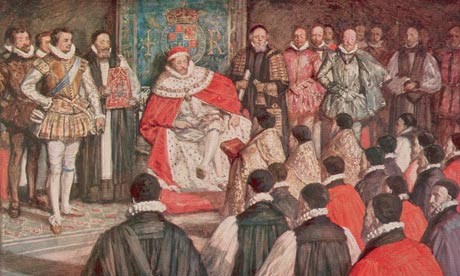
“We all know by now that the King James Bible is 400 years old, right? I mean, it has been everywhere,” writes Matt Trueman in the British daily newspaper the Guardian.
“We’ve had James Naughtie retelling its story on Radio Four,” writes the drama blogger, “a book and a television series from Melvyn Bragg and, over on BBC Four, Adam Nicolson comparing the book to the Millennium Dome. There have been exhibitions, lectures, readathons and flower festivals. This Sunday, there’s even a ‘Bible Cake’ courtesy of Bradford Cathedral.
Theatre has certainly played its part in this cloudburst of anniversary celebrations, notes Trueman. “Over 69 hours at Easter, all 788,280 words of the King James Bible were read onstage at Shakespeare’s Globe, which went as far as to name its current ‘Word of God’ season in its honor.”
Britain’s National Theatre will host a series of readings of its own throughout October, while the Royal Shakespeare Company opens David Edgar’s new play about the book’s conception, Written on the Heart, in Stratford, England.
“Not forgetting, of course, the Bush theatre’s marathon ‘Sixty-Six Books,'” writes Trueman, “which opened the new theater last week and contains 66 new plays by 66 writers, each inspired by a single book within the whole.”
So, why has theater taken up the cause of the Bible so strongly?
“It’s not exactly been sympathetic to organized religion in recent years,” writes Trueman. “Cynics might point to theatre’s tendency to trade on the currency of anniversaries or the bums-on-seats guarantee of an absolute familiar title, but there’s no denying that the King James Bible is a major cultural landmark.
“The King James Bible was, of course, written to be read aloud, so its natural home is the pulpit or the stage. As Henry Hitchings has eloquently pointed out, it is a linguistic feast, full of rolling rhetoric and freshly minted phrases that have worked their way into everyday speech. In that, it has strong ties with our writer-led theatrical culture.”


